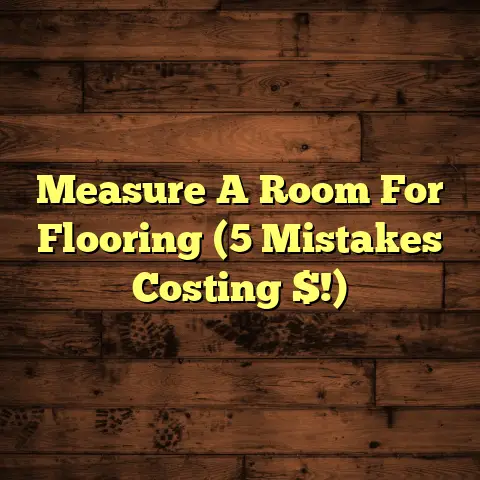Engineered Wood Flooring Cost Uk (Explained)
Engineered Wood Flooring Cost in the UK (Explained)
When it comes to home improvement, flooring is one of the most significant investments you can make. Among the various options available, engineered wood flooring has gained popularity due to its aesthetic appeal, durability, and sustainability. This article will provide a comprehensive overview of the costs associated with engineered wood flooring installation in the UK, addressing key factors that influence pricing, comparisons with alternative flooring options, and maintenance tips to prolong its lifespan.
Overview of Major Cost Factors
Several factors play a crucial role in determining the overall cost of installing engineered wood flooring. Understanding these elements will help you budget effectively and make informed decisions.
1. Area Size
The size of the area where you plan to install engineered wood flooring significantly impacts the total cost. Flooring is generally priced per square meter, so larger spaces will incur higher material and labor costs.
- Cost Estimate: On average, engineered wood flooring costs between £25 to £50 per square metre, depending on quality and design.
2. Hardwood Type
Engineered wood is made up of multiple layers, typically featuring a hardwood top layer. The type of hardwood used influences the price:
- Common Hardwoods:
- Oak: £35 to £60 per square metre
- Maple: £30 to £55 per square metre
- Walnut: £40 to £70 per square metre
- Cherry: £45 to £80 per square metre
3. Labour Costs
Labour costs can vary based on your location in the UK, the complexity of the installation, and the contractor’s experience.
- Average Labour Cost: Expect to pay between £15 and £30 per square metre for professional installation.
4. Additional Considerations
Several additional factors can affect your total costs:
- Floor Removal: If you need to remove existing flooring, expect to pay an additional £5 to £15 per square metre.
- Subfloor Replacement: If your subfloor is damaged or inadequate, replacing it could add £10 to £20 per square metre.
- Material Grade: Higher-grade materials come with a premium price but often ensure better durability and aesthetics.
- Room Size/Layout: Unique layouts or irregularly shaped rooms may increase installation complexity, thus raising costs.
- Installation Type: Floating floors are generally cheaper to install than glue-down or nail-down installations.
Detailed Cost Breakdown
Here’s a more detailed breakdown of costs based on project size and type:
Small Projects (10-20 m²)
- Material Cost: £250 – £1,200
- Labour Cost: £150 – £600
- Total Estimated Cost: £400 – £1,800
Medium Projects (20-50 m²)
- Material Cost: £500 – £2,500
- Labour Cost: £300 – £1,500
- Total Estimated Cost: £800 – £4,000
Large Projects (50 m² and above)
- Material Cost: £1,250 – £5,000
- Labour Cost: £750 – £2,000
- Total Estimated Cost: £2,000 – £7,000
Comparison with Alternative Flooring Options
When considering flooring options, it’s essential to weigh the costs and benefits of hardwood against alternatives like laminate, vinyl, and carpet.
| Flooring Type | Average Cost per m² | Pros | Cons |
|---|---|---|---|
| Engineered Wood | £25 – £70 | Aesthetic appeal, durability | Higher upfront cost |
| Laminate | £10 – £30 | Budget-friendly, easy installation | Less authentic look |
| Vinyl | £15 – £40 | Water-resistant, versatile designs | Can be less durable |
| Carpet | £10 – £50 | Comfortable underfoot | Requires more maintenance |
Signs Your Hardwood Floors Need Replacement
Not all worn-out hardwood floors require replacement; some may simply need refinishing. Here are signs that indicate whether it’s time for replacement:
- Severe Scratches and Gouges: Deep scratches that cannot be sanded out.
- Warping or Buckling: Damage caused by moisture or humidity.
- Extensive Fading or Discoloration: Significant loss of colour that cannot be improved with refinishing.
- Structural Integrity Issues: Loose boards or a spongy feel underfoot.
Pros and Cons of Engineered Wood Flooring
Pros
- Aesthetic Appeal: Offers a high-end look without the high price of solid hardwood.
- Stability: More resistant to moisture and temperature changes than solid wood.
- Sustainability: Often made from sustainably sourced materials.
- Easy Installation: Can be installed as a floating floor.
Cons
- Limited Refinishing Options: Can typically only be refinished once or twice.
- Quality Variability: Lower grades may use inferior materials.
- Cost: More expensive than laminate or vinyl options.
Professional Installation vs DIY
Cost Differences
While DIY installation can save money on labour costs, it’s essential to consider the investment in tools and potential costs associated with mistakes.
- DIY Tools Needed:
- Miter saw: £100 – £300
- Flooring nailer/stapler: £50 – £200
- Measurement tools: £20 – £50
- Other supplies (adhesives, underlayment): £50 – £150
Importance of Proper Installation
Improper installation can lead to problems such as gaps between planks, uneven surfaces, or premature wear. Hiring professionals ensures that the job is done right the first time.
Questions to Ask Hardwood Flooring Contractors
To ensure you choose the right contractor for your project, consider asking:
- What is included in your estimate?
- How long have you been in business?
- Can you provide references from past clients?
- What type of warranty do you offer





